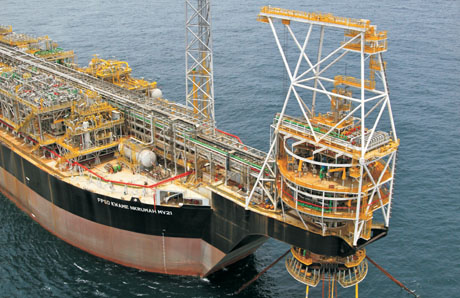
The maritime boundary dispute between Ghana and its western neighbour, Ivory Coast is costing the country money and delays in oil production in new fields.
The Public Interest and Accountability Committee (PIAC) Annual Report for 2016, released last week, said there was a 56 per cent increase in the amount of money spent contesting the Maritime Boundary Dispute with Ivory Coast at the International Tribunal for the Law of the Sea (ITLOS).
The expenditure rose from $1.81 million in 2015 to $2.83 million in 2016, it said.
In March 2010, barely a week after Russian oil producer LUKOil announced it has discovered oil in the Dzata-1 well in the Cape Three Point, the Ivory Coast laid claim to the location where the oil was found – the Dzata-1 well and the Deepwater Tano fall within the same boundary.
Subsequently, in April 2010, the Ghana government set up a Presidential Commission to look into the matter.
As the dispute escalated, Tullow Oil shares fell in March 2015. Shares in Tullow fell 30p, about 7.7 percent on concerns the oil producer’s Tweneboa-Enyenra-Ntomme (TEN) development off the coast of Ghana could fall behind schedule. Tullow is the lead oil producer in Ghana.
Tullow Oil lost over £200 million ($308 million) of its market value on Monday, hit by concerns that a boundary dispute between Ivory Coast and Ghana could delay a project off the coast of West Africa, the Reuters reported.
The PIAC report noted that during the period under review, proceedings at ITLOS continued with both Ghana and Ivory Coast submitting their reports (memorial and counter memorials) to the Court. The draft submissions for the oral hearings were prepared by a team of Ghana’s internal and external lawyers. The oral court hearing took place from February 6 -17, 2017 while a final ruling is anticipated in the fourth quarter of 2017.
According to the report, the GNPC received $88.50 million (representing 38.64 per cent of total petroleum receipt) in 2016 compared to the $126.86 million it received in 2015, translating to a year-on-year drop of 30 per cent.
“The allocation to GNPC during the review period is the lowest it has received since distribution of petroleum revenues begun in 2011.
“For the first time since 2011, the disbursement to GNPC was insufficient to cover the national oil company’s equity financing requirement and expenditure on other exploration and development projects embarked upon in the course of the reporting period,” it said, adding, “This means that GNPC had to rely on its cash reserves, which had been earmarked for milestone projects, to fund equally important expenditures such as staff cost, general operational and administrative expense and the cost of the maritime boundary dispute with Cote D’Ivoire.”
The reported noted that an amount of $12.64 million (classified as ‘capital projects’) was spent refurbishing GNPC’s landed properties in Accra, Tema and Sekondi-Takoradi;
“There was a 38 per cent year-on-year increase in the remuneration for Technical and Petrobusiness support staff employed to execute GNPC’s work programmes. The cost rose from $10.23 million in 2015 to $16.4 million in 2016.
“There was a 56 per cent increase in the amount of money spent contesting the Maritime Boundary Dispute with Cote D’Ivoire at the ITLOS with expenditure rising from $1.81 million in 2015 to $2.83 million in 2016,” it said.
It noted further that an amount of $7.58 million was again spent on the Western Corridor Road Project.
By Emmanuel K. Dogbevi
Copyright ©2017 by Creative Imaginations Publicity
All rights reserved. This news item or any portion thereof may not be reproduced or used in any manner whatsoever without the express written permission of the publisher except for the use of brief quotations in reviews.
